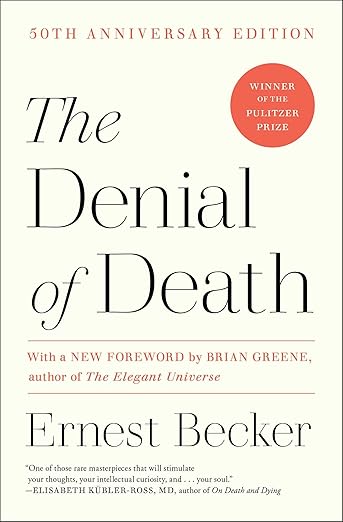
The Denial of Death
- Pulitzer Prize–winning classic by Ernest Becker, The Denial of Death examines humanity’s existential fears and the vital lie we tell to cope with mortality, offering profound insights on why we live.
- Becker challenges Freud’s views to uncover how our avoidance of death shapes culture and identity, inspiring readers to confront mortality and embrace a more authentic, courageous life.
- The Denial of Death remains a landmark existential psychology work, celebrated for its profound exploration of mortality denial.
- Readers praise its multidisciplinary synthesis but warn of dense academic prose and heavy theoretical passages.
- Several customers report print and binding problems—tiny typefaces, cheap paper stock, and even missing pages—in certain Amazon editions.
- No credible rumors of fraud or safety concerns have emerged; criticisms center on production quality and personal taste.
- Best suited for serious students of psychology, philosophy, and cultural anthropology—choose your edition carefully to avoid defects.
- Origin and accolades of the book underlie its enduring influence.
Product Overview
Ernest Becker’s The Denial of Death is a seminal text in existential psychology and cultural anthropology, awarded the 1974 Pulitzer Prize. Drawing on Freud, Kierkegaard, Rank, and Otto Rank, Becker argues that much human behavior is driven by symbolic defences against the terror of mortality. With its blend of philosophical insight and psychoanalytic theory, the book challenges readers to face the “vital lie” of believing in personal invulnerability.
Amazon offers this title in various formats—paperback, trade hardcover, and Kindle. Customer feedback highlights inconsistent print runs, leading to variations in font size, paper quality, and binding strength. Prospective buyers should review seller ratings and edition details to ensure a satisfactory physical copy.
- Core arguments blend psychoanalytic and existential perspectives.
The Denial of Death Review: Honest Findings
At its heart, Becker explores how individuals and societies create hero systems—from art and science to religion—to transcend the anxiety of death. His thesis that “immortality projects” underpin cultural institutions has sparked ongoing debate in psychology and philosophy departments worldwide.
Proponents applaud the book’s rigorous scholarship and eloquent synthesis of thinkers. Critics, however, argue that certain sections verge on dogmatic religious advocacy or rely on now-“dated psychoanalytic models.” Despite these debates, the work’s intellectual impact over nearly five decades is undeniable.
- Widely celebrated for deep insights into human anxiety and motivation.
Positive Feedback & Highlights
Readers frequently call the book an “intellectual tour de force”. Highlighted strengths include:
- Becker’s analysis of Agape and Eros as dual forces driving human striving for significance and unity.
- Quotable passages blending poetic reflection with clinical observation, such as “creation is a nightmare spectacular…”
- Its role as a foundational text in courses on existential psychology and cultural anthropology.
For many, confronting the “grotesque fate” of mortality through Becker’s lens is both provocative and transformative. The text offers a rare fusion of philosophical depth and psychoanalytic rigor.
- Complaints divide into physical defects and theoretical disagreements.
Negative Reviews & Rumor Analysis
Edition & Print Quality
Numerous buyers report physical flaws in certain editions:
- Tiny, gray typefaces (often size 8 or smaller) on off-white, low-grade paper.
- Trade hardcovers that feel like paperbacks in disguise, with weak glue causing loose or missing pages.
- Mismatched covers and missing sections—one shopper noted over 60 pages fallen out before use.
These issues appear linked to specific print runs by The Free Press rather than the content itself. Prospective buyers should check seller reviews and consider alternate editions or formats (Kindle, library) to avoid disappointment.
Content & Theoretical Critiques
On the intellectual side, some readers find Becker’s arguments:
- Outdated—tied heavily to mid-20th-century psychoanalysis, with limited engagement of modern cognitive science.
- Religiously biased—critiques overhaul as prescribing faith as the primary remedy for death anxiety.
- Condescending in tone—particularly toward mental illness, gender, and sexual orientation.
Despite these objections, no verified rumors of plagiarism, factual errors that threaten safety, or major authenticity scandals have been documented. The negative feedback remains focused on production quality and academic disagreements.
- Ideal for readers seeking a rigorous, scholarly exploration of mortality.
Who Should Consider The Denial of Death?
This cornerstone text best serves:
- Graduate students and academics in psychology, philosophy, and anthropology.
- Intellectually curious readers comfortable with dense theoretical material.
- Those ready to engage deeply with their own existential anxieties.
If you prefer lighter, more accessible self-help or contemporary neuroscience approaches, you may find Becker’s style challenging. Also, double-check the edition before purchasing to avoid known printing defects.
- A demanding classic with occasional production flaws but no major scandals.
Conclusion: Final Verdict
Ernest Becker’s The Denial of Death endures as a seminal investigation into the human condition, illuminating how death denial fuels cultural and personal projects. While some Amazon editions suffer from poor print quality, the book itself remains uncontested in authenticity and scholarly value.
For serious students of existential thought, Becker’s Pulitzer Prize–winning masterpiece is indispensable—provided you secure a well-reviewed edition or opt for a digital copy. Casual readers should be aware of its intellectual density and consider their tolerance for dense psychoanalytic discourse before diving in.

The Denial of Death
- Pulitzer Prize–winning classic by Ernest Becker, The Denial of Death examines humanity’s existential fears and the vital lie we tell to cope with mortality, offering profound insights on why we live.
- Becker challenges Freud’s views to uncover how our avoidance of death shapes culture and identity, inspiring readers to confront mortality and embrace a more authentic, courageous life.



Comments